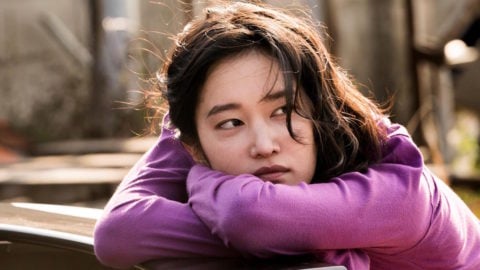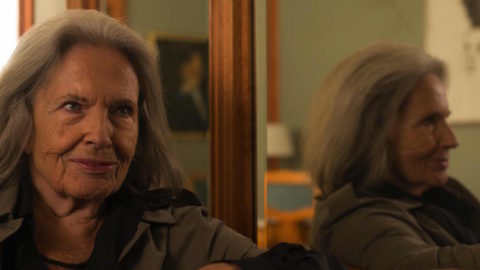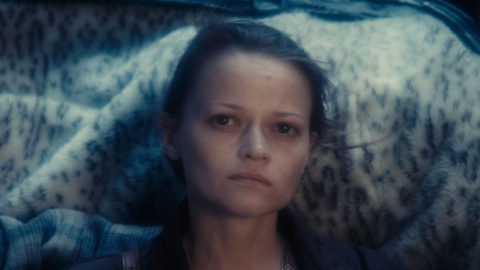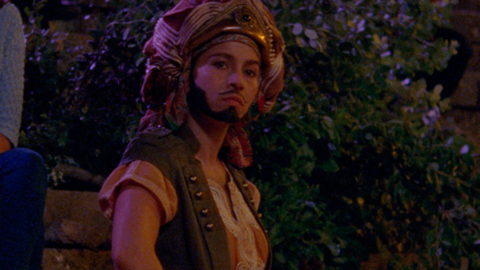Cannes Interview: Ulrich Köhler
One of the most seductive fantasies—and productive thought experiments—in all of fiction, the last-man-on-earth scenario receives a typically wry, intelligent, and restrained treatment in Ulrich Köhler’s In My Room. The German director’s fourth feature, which premiered in the Un Certain Regard section of Cannes, opens by establishing the desultory existence of sad-sack, fortyish TV cameraman Armin (Hans Löw). Summoned home to help his father tend to Armin’s terminally ill grandmother, he wakes up one morning to find the world around him entirely depopulated.
Köhler’s previous films—Bungalow (2002), Windows on Monday (2006), Sleeping Sickness (2011)—are among the signature achievements of the so-called Berlin School. In My Room uses a high-concept genre framework to both refine and deepen his exploration of such recurring themes as estrangement and belonging, mobility and stasis. The day before his film’s premiere, Köhler spoke to us about the appeal of castaway stories, the challenge of representing death on screen, and his love of the Pet Shop Boys.
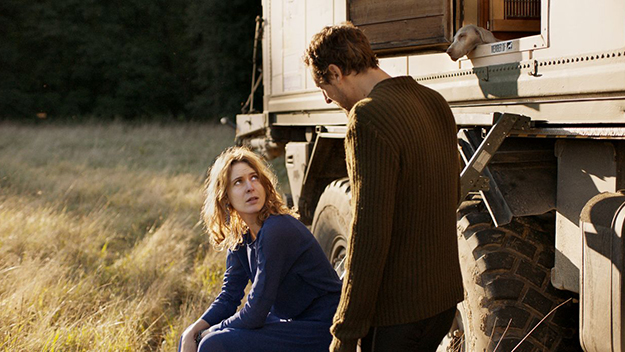
The most immediately striking thing about the film is its tone as it relates to the premise: it’s a realistic film with a fantastical premise.
I wanted to stay within realistic parameters. I started thinking about this film because of a few novels I really like: Arno Schmidt’s Black Mirrors, David Markson’s Wittgenstein’s Mistress, and Marlen Haushofer’s The Wall. All three are kind of Robinson Crusoe variations. I’m not really attached to dystopian cinema, but I was interested in working within the genre without fulfilling its normal dramaturgical conventions.
Can you say a bit about the structure of the film? I’m interested specifically in your decision to both defer and elide the apocalyptic event, which doesn’t happen until some way into the movie.
I wanted to make a film with a character who’s established in his normal environment but also detached from it. That’s what you see in the beginning: he isn’t really at home in this world, but then he becomes at home when there are no longer any social constraints. I really didn’t want to give a reason for the disappearance of mankind. I looked at a lot of dystopian fiction, and found that once you give an explanation, you’re only ever talking about that and you never get to the things that really interest me.
To the more philosophical questions…
Exactly. For me, the central questions were: who am I?, what am I made of?, what does the social world make of me? If we are what our interactions make of us, what happens when these interactions cease? The main character is someone who refuses to become bourgeois, and then, absurdly, becomes bourgeois when there’s nobody else left. He wants to be constructive, to build a new world, to have a family, in contrast to the woman who appears.
We spend much of the first act with Armin as he spends time with his dying grandmother. There’s a level of detail and degree of tenderness in these scenes that seem born of personal experience.
There is an autobiographical component, which comes from the days I spent with my father as my grandmother was dying. I remember listening to her breathing, and imagining that the outside world had ceased to exist, opening the door and finding that nobody was there. The closer we got to filming, the more terrified I became. I was worried about exploiting this experience, even though I felt strongly about transmitting it to the audience. For a long time, I thought I would keep it mainly off screen, not showing the dying person as much as I do now. But then I met the actress [Ruth Bickelhaupt] and she gave me a lot of confidence. She has a lot of humor; she’s quite alive and very optimistic. If I hadn’t met her, I might not have filmed it that way.
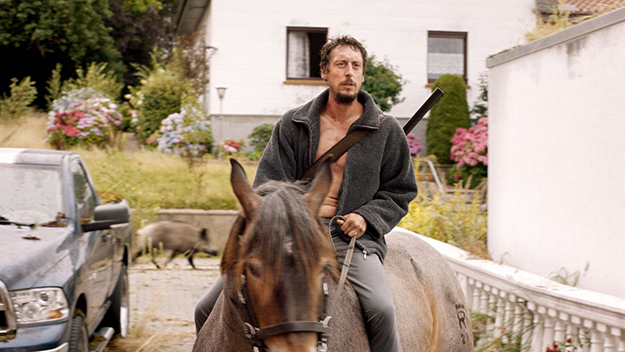
Was there something specific about the usual representation of death and mortality that you wanted to challenge?
I struggled to find a movie that presented death in a way that I had experienced it. I think in most art-house films, it happens mostly off screen, which is completely understandable. Otherwise, it’s used as something spectacular. My father’s a doctor, and when I was a child with him in Africa and saw him operating on people, I found that death is something you get used to, in a way, and the process of watching and waiting also involves trivial things. It’s completely different when it’s an accident or a young person dying, but when an old person dies, you get used to the thought, and though it’s a really sad moment and you cry, it can also be very liberating.
The middle section seems to pose several challenges: since Armin is now totally alone, there are long, wordless passages that must have involved a good deal of animal wrangling.
Yes, and most of it wasn’t done by professionals! That’s the only interaction you have on a planet without other human beings, so it became pretty automatic when I was writing that there would be the story with the dog, and the goat, the horse. I learned to really love goats. They’re very stubborn, but if you push the right buttons, you can deal with them.
The third act underscores something that is usually built into these scenarios, which is that the last man is also the first man—an Adam who in this case encounters an Eve. Can you say a bit about bringing a female character into the situation?
Conceptually, it was clear for me that he would be alone for a long time—that it was a kind of castaway story—and then I would test his contentment with this next step where happiness could be even greater. It felt logical to give him the opportunity to start a family. And it was interesting to have a female character who does what men typically do in fiction. She has accepted that it’s the end, and in an existentialist way, decides to enjoy what’s there, but refuses to build a future.
I loved the choice of the Pet Shop Boys track “Later Tonight”—and it’s your second use of a Pet Shop Boys song after “To Speak Is a Sin” in Windows on Monday.
I have a good friend who is also my musical consultant [Martin Hossbach] and he’s the biggest Pet Shop Boys fan, so they always come up. As a teenager, I missed out on pop music because I listened to a lot of jazz. One of the first albums to really hit me was Very by the Pet Shop Boys, when I started listening to pop music that I should have discovered as a 14-year-old, only it was 10 years later. The main character is also partly inspired by a musician friend of mine, who had a great record in the 1990s when his band tried to become something like the German Pet Shop Boys but tragically failed. When Armin first puts on music in his apartment and plays 10 seconds of a song, that’s the music of that band, so there’s an anecdotal connection as well.
Dennis Lim is the director of programming at the Film Society of Lincoln Center.



